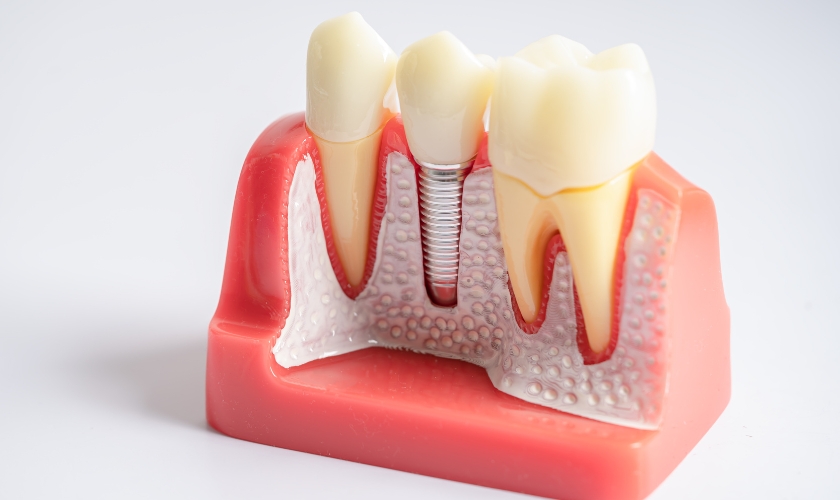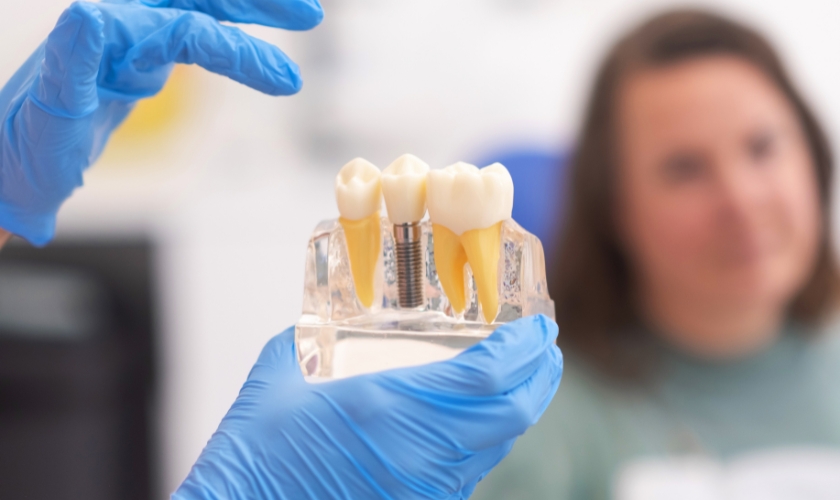
By West Albany Dental
Dental implants are often defined as the gold standard for tooth replacement. Unlike dentures or bridges, they offer a lasting solution that closely resembles and functions like natural teeth. However, with a significant investment involved, a crucial question arises “How long do dental implants last?”
The answer, like most things in dentistry, is a complex one. While dental implants in Albany are designed for a lifetime, other factors influence their overall lifespan. Here’s a blog deep dive into what you can expect regarding implant longevity and how to maximize it.
The Two Parts of a Dental Implant
To understand implant lifespan, it’s important to differentiate between the two components:
- The Implant Post: This screw-like titanium fixture is surgically placed in your jawbone. As time passes, the bone merges with the implant through osseointegration, forming a robust and stable base.
- The Dental Crown: This prosthetic tooth sits on top of the implant post, restoring the look and function of the missing tooth. Crowns are commonly crafted from porcelain or zirconia materials.
How Long Do Dental Implants Last?
The good news is that with proper care, the implant post has the capability to endure indefinitely. Studies show a success rate of over 90% after ten years, and many implants function flawlessly for decades.
Yet, the dental crown affixed to the implant presents a contrasting situation. Crowns experience wear and tear from chewing and may need replacing after 10-15 years, depending on the material and your oral habits. Dental implants in Albany offer a reliable and long-term solution for missing teeth, combining the durability of the implant post with the replaceable nature of the crown to ensure both functionality and aesthetics over time.
Factors Affect Implant Lifespan
Several factors influence how long your dental implants last:
- Oral Hygiene: Maintaining excellent oral hygiene, including regular brushing, flossing, and professional cleanings, is crucial. Poor hygiene can lead to peri-implantitis, an infection that can damage the bone around the implant and threaten its lifespan.
- Diet: A balanced diet low in sugary and acidic foods helps maintain overall oral health and minimizes wear on the crown.
- Smoking: Smoking increases the chance of implant failure due to compromised healing and reduced blood flow.
- Bruxism (Teeth Grinding): Teeth grinding can put excessive pressure on implants and the crown, potentially leading to cracks or fractures. Nightguards can help protect them.
- Health Conditions: Medical conditions such as diabetes or osteoporosis can affect bone health and potentially impact implant success.
- Location of Implant: Implants in the back of the mouth experience greater chewing forces and might require replacement sooner than those in the front.
- Material of the Crown: Porcelain crowns are generally more susceptible to chipping or wear compared to zirconia crowns, which offer greater strength and durability.
Maximize The Lifespan of Your Dental Implants
Here’s how you can extend the life of your implants:
- Practice meticulous oral hygiene. Brush twice a day, floss daily, and schedule regular professional cleanings.
- Maintain a healthy diet. Make those sugary & acidic foods limited as they can contribute to gum inflammation and implant failure.
- Quit smoking. Smoking significantly increases implant failure rates.
- Use a nightguard if you have a habit of teeth grinding. Nightguards protect implants from the damaging effects of teeth grinding.
- Manage underlying health conditions. Work with your doctor to maintain good control of any health conditions that could affect bone health. Dental implants in Albany can provide a dependable solution, especially when combined with proactive management of your overall health.
- Daily checkups: Schedule regular dental checkups to check the status of your implants and address any issues early on.
After careful consideration and thorough research, it has become evident that the question of how long dental implants last cannot be definitively answered. While some experts claim that dental implants lasts a lifetime if they’ve been cared properly, others argue that they may need to be replaced after 10-15 years. The uncertainty surrounding the longevity of dental implants only adds to the drama and suspense surrounding this topic. Patients must weigh the benefits of dental implants against the potential risks and uncertainties that come with them.
Ultimately, the decision on whether or not to proceed with dental implant surgery is a personal one which needs careful consideration & consultation with trusted dental professionals in Albany, in order to make an informed choice. The dramatic nature of this debate underscores the importance of thoroughly educating oneself before making such a significant decision regarding oral health.
5 Trending FAQs on Dental Implants!
Ans. The surgical procedure for placing implants does involve some discomfort, but dentists use local anesthesia and other methods to minimize pain.
A. Recovery time varies depending on the procedure’s complexity. It typically spans a few days to a week.
Ans. Most adults in good general health and with sufficient jawbone density are good candidates for dental implants. During your appointment, your dentist will assess if you are a suitable candidate.
Ans. Alternatives include dentures and bridges, but they are not as secure or long-lasting as implants.
Ans. The price of dental implants can fluctuate based on several factors, including the number of implants needed, location, and dentist fees. Generally, implants are a significant investment, but their long lifespan and improved quality of life make them a worthwhile option for many people.
Dental implants provide a dependable and durable solution for tooth replacement. While the implant post itself has the potential to last a lifetime, the crown might need replacing after a decade or so. By consistently caring for and maintaining them, you will prolong the lifespan of your dental implants while ensuring a beautiful, functional smile for upcoming years.








